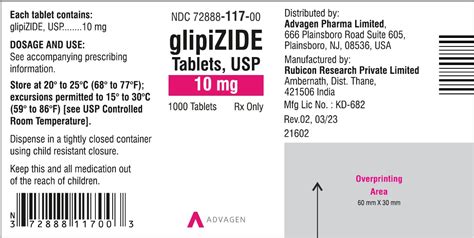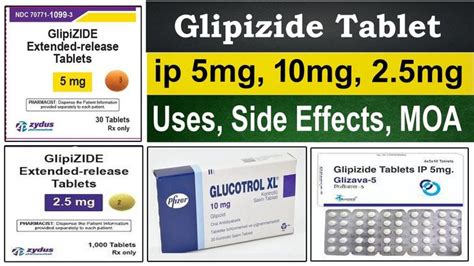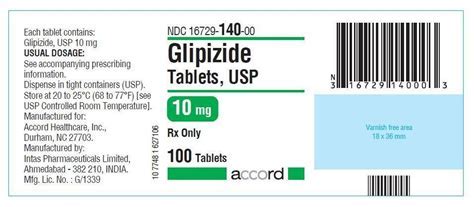Intro
Learn about Glipizide 5mg Tablet, a medication used to treat type 2 diabetes. Discover its uses, potential side effects, and dosage guidelines. Understand how Glipizide works to lower blood sugar levels, and explore its benefits and risks. Get informed about this oral anti-diabetic drug and manage your diabetes effectively.
Glipizide is a medication used to treat type 2 diabetes, a condition in which the body does not use insulin properly. It belongs to a class of medications called sulfonylureas, which work by stimulating the pancreas to release more insulin. In this article, we will discuss the uses, side effects, and dosage guide of Glipizide 5mg tablets.
What is Glipizide Used For?
Glipizide is used to treat type 2 diabetes in adults. It helps to lower blood sugar levels by stimulating the pancreas to release more insulin. Glipizide can be used alone or in combination with other medications, such as metformin, to achieve better blood sugar control.

How Does Glipizide Work?
Glipizide works by binding to a specific receptor on the surface of pancreatic beta cells. This binding causes the beta cells to release more insulin, which then helps to lower blood sugar levels. Glipizide also has a secondary effect of decreasing the amount of glucose produced by the liver.
Benefits of Glipizide
Glipizide has several benefits, including:
- Improved Blood Sugar Control: Glipizide helps to lower blood sugar levels, which can reduce the risk of complications associated with diabetes, such as heart disease, kidney disease, and nerve damage.
- Convenient Dosage: Glipizide is available in a once-daily dosage form, making it easy to incorporate into a daily routine.
- Affordable: Glipizide is a relatively affordable medication compared to other diabetes medications.
Side Effects of Glipizide
Like all medications, Glipizide can cause side effects, some of which are serious. Common side effects of Glipizide include:
- Hypoglycemia: Low blood sugar is a common side effect of Glipizide, especially when taken with other diabetes medications.
- Dizziness: Glipizide can cause dizziness, especially when standing up quickly.
- Headache: Some people may experience headaches when taking Glipizide.
- Nausea: Glipizide can cause nausea and vomiting.
- Skin Rash: Some people may experience a skin rash when taking Glipizide.

Serious Side Effects of Glipizide
In rare cases, Glipizide can cause serious side effects, including:
- Severe Hypoglycemia: Severe low blood sugar can cause seizures, coma, and even death.
- Allergic Reactions: Some people may experience an allergic reaction to Glipizide, which can cause symptoms such as hives, itching, and difficulty breathing.
- Liver Damage: Glipizide can cause liver damage, especially when taken in high doses.
Dosage Guide
The recommended dosage of Glipizide is 5mg once daily. The dosage may be adjusted based on blood sugar levels and other factors. It is essential to follow the dosage instructions provided by your doctor or pharmacist.

Precautions
Before taking Glipizide, it is essential to inform your doctor or pharmacist about any medical conditions, including:
- Kidney Disease: Glipizide may not be suitable for people with kidney disease.
- Liver Disease: Glipizide may not be suitable for people with liver disease.
- Pregnancy: Glipizide may not be suitable for pregnant women.
- Breastfeeding: Glipizide may not be suitable for breastfeeding women.
Interactions
Glipizide can interact with other medications, including:
- Warfarin: Glipizide can increase the risk of bleeding when taken with warfarin.
- Beta-Blockers: Glipizide can increase the risk of hypoglycemia when taken with beta-blockers.
- Fluconazole: Glipizide can increase the risk of hypoglycemia when taken with fluconazole.

Conclusion
Glipizide is a medication used to treat type 2 diabetes. It works by stimulating the pancreas to release more insulin. While Glipizide can be effective in lowering blood sugar levels, it can also cause side effects, some of which are serious. It is essential to follow the dosage instructions provided by your doctor or pharmacist and to inform them about any medical conditions or medications.
Frequently Asked Questions
What is the recommended dosage of Glipizide?
+The recommended dosage of Glipizide is 5mg once daily.
Can Glipizide cause hypoglycemia?
+Yes, Glipizide can cause hypoglycemia, especially when taken with other diabetes medications.
Is Glipizide suitable for pregnant women?
+No, Glipizide may not be suitable for pregnant women. It is essential to inform your doctor or pharmacist if you are pregnant or planning to become pregnant.
We hope this article has provided you with a comprehensive overview of Glipizide 5mg tablets. If you have any further questions or concerns, please do not hesitate to comment below.
